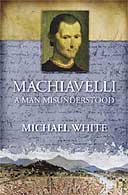
Machiavelli: A Man Misunderstood
by Michael White
Little, Brown £16.99, pp304
'Hey,' said a guide at the Clinton library opening after chatting to George W's evil genius, 'you're not such a scary guy after all.' At which point, Karl Rove looked down at him scornfully. 'Yes, I am', he said. Maybe Niccolò Machiavelli would say much the same to Michael White.
The thesis here, the reason for yet another biography of the first and greatest spin maestro general, is that Machiavelli was really a pretty straight sort of guy. He served his Florentine masters faithfully with surpassing diplomatic skill. He was betrayed by their indecision and ineptitude. The triumph of his books, especially The Prince, lies in the shrewdness of their observation and clarity of their political prescriptions, not in their brutal brilliance.
Is this the same Machiavelli, who malignly declared of men, in general, that 'they are ungrateful, fickle, liars and deceivers; they shun danger and are greedy for profit; while you treat them well, they are yours'? Is it the Machiavelli who went to a grisly brothel in Verona and wrote to his friends about how, 'hopelessly horny', he 'went to it' between the 'flabby thighs' of a hideous crone whose breath stank to retching point? 'I shall stake my berth in heaven that as long as I am in Lombardy I'll be damned if I think I shall get horny again'.
That Machiavelli would not even have been invited to the opening of the Clinton library. He was a compulsive fornicator and superbly cynical commentator. It's hard to think of him landing a job on the Spectator, let alone in Downing Street. He may occasionally have been a trifle misunderstood, as White argues, but never catastrophically so. It is the coldness of his judgments - their lack of sentiment, their simple calculation - that sees his name live on, as modern as the latest ploy from Rove or the last botched intervention from Alastair Campbell.
Once you begin to try to turn The Prince from what it is, a guidebook to power, written to curry favour with the Medicis, into something kinder and gentler, you sell Machiavelli far shorter than he deserves. This isn't a scholarly treatise but a work in progress, ruthlessly targeted to restore its author's depleted fortunes. This is a job application. And it worked. In the end, the great manipulator did return to his place in the sun. His life had its violent ups and vicious downs, but he survived.
There is the continuing fascination. White makes a diligent, often delightful, stab at rendering complex subjects and complex times comprehensible. It's a good, informative read planted in the outer groves of academe.
His Machiavelli is a human being with a buzzing brain and a continual throbbing in his loins. The Florence he served was tiny: 50,000 or so souls, always thrashing round for a settled way of governance and clear path to survival as the French and Spanish came marching through.
Machiavelli helped stave off the inevitable but, only three years after he died, his independent Florence was dead too. Without the wonder of his writings, he would have been a footnote in other books about a time of tumult and wondrous creativity.We know him because of writing, not because of his life.
The Prince and The Discourses on the First 10 Books of Titus Levy survive and prosper because they separate the art of politics from ideology. They pay homage to winners and write off losers. They take the Borgias and the Medicis and turn their histories into textbooks for survival. They are worldly-wise and lip-curling. They tell us that nothing changes. They are, in so many ways, as new and as old as New Labour.
Was the Machiavelli who wrote them a nice chap? Probably not. He was up to every game in town. White tells how phoney messages from a mate were contrived - in a lather of galloping horses and lustrous seals - to impress some Franciscans.
Peter Mandelson might find that a useful gambit on European Commission business. Karl Rove might devise an internet version for the midterm elections.
The black art of old Florence, sustained through five centuries, is as stunning as anything you'll find in the Uffizi. But let's admire it for its cold, cold heart, not try to find reasons to love it.

